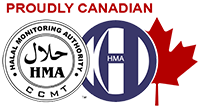Ali Akhavan walks past rows of frozen and freshly cut pieces of meat in his Mediterranean and Middle Eastern grocery store, Marché Akhavan, in Notre Dame de Grâce.
Chicken wings, cubes of lamb, thick cuts of beef: The labels say “halal” – which means “permissible” in Arabic – but Akhavan isn’t certain whether Islamic guidelines were properly followed when the food was prepared.
“We go on trust,” he said as shoppers strolled by the counters of spiced nuts and marinated olives behind him. “We don’t have inspectors.”
Halal rules govern how food is prepared in accordance with Islamic theology, and it’s a lucrative business: Global sales of halal products are estimated to be in the hundreds of billions of dollars a year.
Unlike Montreal’s Jewish community, which has a long-established kosher monitoring system, there are few safeguards in the city to ensure Muslim consumers are getting food that respects their dietary restrictions.
Reports abound of companies misleading consumers by falsely labelling their products halal to take advantage of the growing global market.
Members of the Muslim Council of Montreal are seeking to instill some confidence by adopting an island-wide uniform labelling system for halal products.
For years, Montreal Muslims went to small, family-run butchers in the community who would slaughter animals themselves and could be trusted, said Salam Elmenyawi, an imam who is president of the Muslim Council of Montreal.
But the community is growing fast and there aren’t enough small stores to meet the demand for trusted halal food, he said.
Elmenyawi said he’s been in contact with larger supermarkets in the city that want to start offering more halal products, but he’s concerned that those who are giving halal certification don’t have enough resources to follow up with regular inspections, which leaves room for fraud.
“The issue is not really for giving certification, it’s how to take it away,” Elmenyawi said.
Members of the Muslim council floated the idea of lobbying the city of Montreal along with Quebec’s Agriculture Department to arm government food inspectors with the authority to fine stores caught carrying false halal products.
They also discussed the idea of starting a halal certification body recognized by the Muslim council.
Hélène Trépanier of the Agriculture Department said its inspectors are present for halal slaughters in meat facilities, but have no authority to certify the meat is being properly handled according to strict Islamic rules.
But Trépanier said there is room in Quebec law to accommodate a system for a specific type of food certification.
To get the process moving, Elmenyawi said, the Muslim council will have to prepare a proposal for Quebec.
Another idea discussed by the imams is to work more closely with the Toronto-based Halal Monitoring Authority, which claims to be the only Canadian-owned and operated halal monitoring organization and is recognized by the Canadian Food Inspection Agency.
The Toronto organization, a branch of the Canadian Council of Muslim Theologians, toured the country in 2004 and inspected about 35 slaughterhouses, meat processing plants and butchers that claimed to produce or sell halal food.
They discovered the majority were not fully complying with halal guidelines, said Yusuf Badat, an imam with the organization.
In response, the Halal Monitoring Authority decided to start certifying food products, not facilities, Badat said.
A company that wants to be certified halal by the organization must pay $13.50 an hour for an inspector to watch the entire slaughtering process every time an animal is killed.
If a butcher wants to be certified, all the meat sold must be certified, too.
The butcher must also pay between $75 and $150 a month for daily inspections.
Badat said that 100 businesses, mostly in Ontario, are inspected and certified by the Halal Monitoring Authority.
The Toronto Star reported last month that some meat producers in that city were complaining that the costs imposed by the Halal Monitoring Authority were hurting their profits.
But Elmenyawi said demand in the Quebec region will be high enough to mitigate the extra expenses producers must incur.
Saad Mouaddab, owner of Délices Al-Manar, one of three meat companies inspected by the Halal Monitoring Authority in Quebec, said that it’s extra work to fill out the documents and deal with the inspectors, “but it’s worth it.”
“(Other businesses) want to get into the market, it’s about money,” Mouaddab said. “They don’t care about the religious and spiritual aspects behind it.”
“But if we say it’s halal, we have to make sure it’s halal.”
gvaliante@thegazette.canwest.com
– – –
What Is Halal?
The following animals are halal:
– All domestic birds, including chickens, ducks, turkeys
– All cattle
– Sheep
– Goats
– Camels
– All buck, including deer, hare and rabbit
– Fish
– Locusts
The above animals are halal only if they are slaughtered in the following manner, excluding fish and locusts:
– The slaughterer must be Muslim.
– The slaughterer must invoke the name of Allah upon the animal to be slaughtered by reciting: “Bismillahi Allahu Akbar” (in the name of God Almighty, the greatest) or at the very least recite “Bismillah,” and kill the animal right after recital without significant delay.
– The slaughterer’s knife must be extremely sharp so the animal suffers minimal pain.
– The slaughterer must sever the following arteries: trachea, esophagus, and both jugular veins. If it is not possible to do so, then he must sever at least three.
– The slaughterer must conduct the slaughter manually and swiftly. The knife must not be lifted before the cut is complete and the cut must be below the Adam’s apple.

